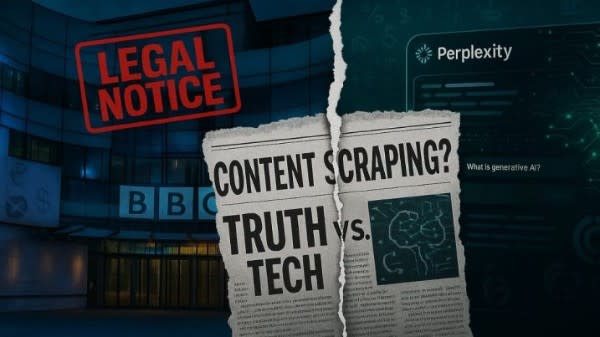Date: Friday, 15th August 2025
Issue: Should AI companies like Perplexity pay for using news content from publishers?
Short Answer: The Perplexity dispute underscores the urgent need for AI companies to strike licensing agreements with publishers, or risk eroding the financial foundations of quality journalism.
Facts & Key Developments
In June 2025, the BBC filed a formal legal complaint against Perplexity, a US-based AI chatbot firm, alleging unauthorised reproduction of its news content. The broadcaster asserts that Perplexity's responses included nearly verbatim passages from its articles, violating the BBC’s robots.txt file, which explicitly forbids automated scraping of its content. The BBC has called for the swift removal of the unlicensed material and seeks financial compensation for the alleged infringement. Perplexity has denied wrongdoing, insisting that its platform creates summaries drawn from publicly available information, which it argues falls under “fair use” provisions in US copyright law. Furthermore, Perplexity has accused the BBC of supporting Google’s alleged monopoly by attempting to restrict competition.
This dispute forms part of a wider pattern of legal challenges from media organisations over AI use of copyrighted material. Other major publishers, such as The New York Times and Dow Jones, have taken legal action against Perplexity and similar AI developers for unauthorised use of licensed content. While Perplexity has signed revenue-sharing agreements with some publishers, including Time magazine and Der Spiegel, it remains embroiled in other disputes. To strengthen its legal position, the BBC has also begun registering its content with the US Copyright Office: a sign of the increasing seriousness with which public service broadcasters regard this challenge.
Opinion & Analysis
The real issue here is fairness and sustainability. Journalism, mainly produced by public service broadcasters like the BBC, is expensive and labour-intensive. If AI tools can freely scrape and reproduce this content without paying for it or adequately crediting the source, they profit from the efforts of others without contributing anything in return. This echoes the clashes that led Australia to introduce its News Media Bargaining Code in 2021, compelling Google and Meta to compensate publishers for using their content. The UK appears on the cusp of similar regulatory pressures. Unlike social media platforms, AI’s ability to synthesise and replicate content poses an even greater risk to the news industry: users may receive answers directly from AI without visiting the original news websites, depriving publishers of critical traffic and revenue.
Legally, the BBC has a strong argument that Perplexity’s near-verbatim reproductions cross the line from fair summarisation into copyright infringement. UK copyright law offers less flexibility than the US fair use doctrine, placing AI firms operating in the UK at greater liability risk. This legal uncertainty will doubtless fuel further disputes and calls for reform. Nonetheless, beyond legality lies a broader public interest concern. A free, independent press is essential for democracy.
The incentive to invest in rigorous reporting diminishes if the financial model that sustains quality journalism erodes because AI freely exploits news content. This threatens not only the survival of publishers but also the quality of information available to the public. AI companies claim they “democratise” access to information. That may be true if their tools add value and direct users to sources. Yet when AI-generated responses closely mirror original articles, without attribution or encouraging click-throughs, these platforms act as substitutes rather than complements to publishers, effectively free-riding on intellectual property.
Conclusion
The conflict between the BBC and Perplexity goes beyond mere copyright issues; it represents a crucial moment highlighting the urgent requirement for defined licensing frameworks between AI firms and news organisations. Without these agreements in place, the sustainability of independent journalism faces significant jeopardy. The legal environment in the UK is poised for transformative changes. Licensing systems akin to Australia’s News Media Bargaining Code seem unavoidable. The legal industry must brace for an influx of copyright disputes and adjustments in regulations that balance fostering AI innovation and ensuring the ongoing societal necessity for a well-supported, independent press.
